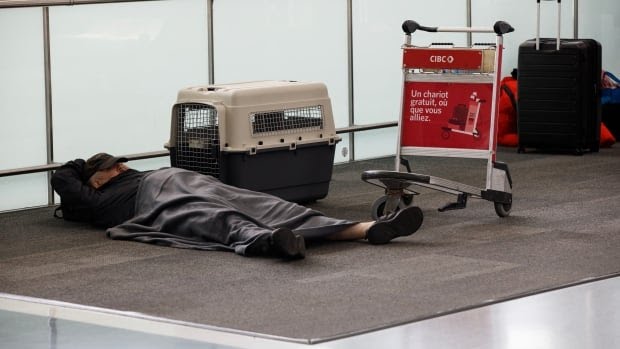
Regina resident Ryan Coulter was on his way back from a vacation in Tennessee last weekend when the first leg of his trip — a flight from Nashville to Montreal — was diverted to Cincinnati because of thunderstorms.
After that forced him to miss a handful of connections on his way back to Saskatchewan, he landed in Vancouver, where he was given a brochure for hotels. Opting to forgo a $700 out-of-pocket expense, he instead hung out overnight in a food court until his flight home the next morning.
“You kind of wish they could at least hand out food vouchers when something happens, like the weather delays, all the [missed] connections,” he told CBC News.
He’s one of many Air Canada passengers whose flights were cancelled or delayed during Canada Day weekend, with almost 2,000 flights affected during a three-day period. Due to the weather being outside of the airline’s control, Coulter wasn’t eligible for compensation of any kind.
So what is a Canadian airline’s responsibility to passengers as the summer travel season gets in full swing? What are your rights as a traveller? Here’s what you need to know.
Airlines have to comply with Canada’s Air Passenger Protection Regulations (APPR). When a flight is delayed or cancelled, airlines must first inform passengers of the reason in plain language, regardless of whether the situation is in their control or not. They also have to ensure that the traveller completes their journey.
A spokesperson for Air Canada told CBC News that the Canada Day weekend disruptions were due to bad weather, particularly storms in the U.S. and Montreal. It also cited the busy travel season.
“As with any system, when it is operating at full capacity it may slow processes down and take longer to recover when issues arise,” the statement said.
The APPR lists 10 scenarios that would count as being outside of an airline’s control, including bad weather, war, a medical emergency, airport issues or a security threat. If an earlier flight impacted by something out of the airline’s control later affects a connecting flight, you won’t be compensated for the second leg of your travels, either.
If a disruption is out of the airline’s control
Airlines also don’t have to provide food, drink or overnight lodging if they determine that a delay or cancellation was beyond their control. But one advocate says not to give up if an airline shrugs its shoulders.
“Don’t take Air Canada at their word that it’s outside their control,” said John Lawford, executive director of the Public Interest Advocacy Centre in Ottawa. “Because if you concede that something is outside their control, then they don’t owe you compensation.”
When a flight is delayed for more than three hours, the airline has to rebook passengers on the soonest possible flight to their destination, should the traveller want them to.
But if your reason for travel was made futile by a missed flight or a long delay, the airline has to refund the ticket if a customer asks them to, and arrange for that person’s return to their original location.
The airline always has to communicate the reason for disrupting travels and what recourse an affected passenger might have against the carrier. Another rule under the APPR: Expect an update every 30 minutes until you have a new departure time or itinerary.